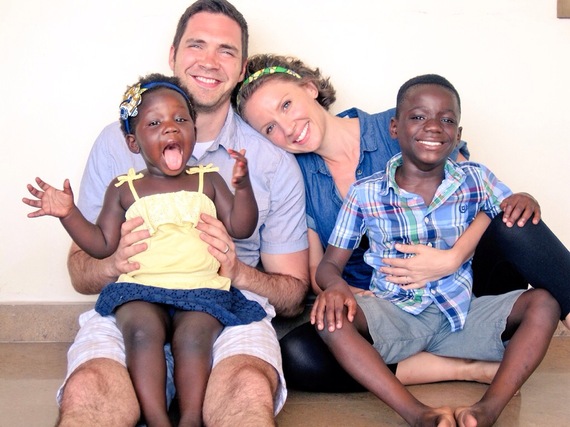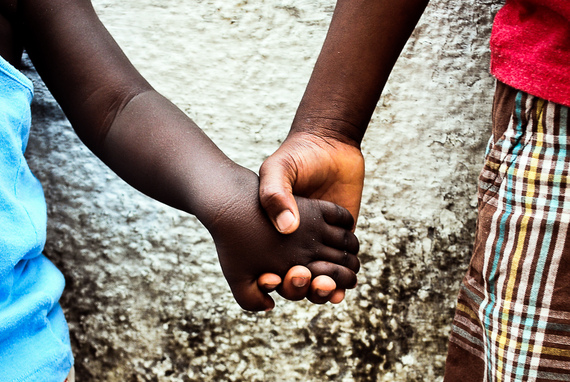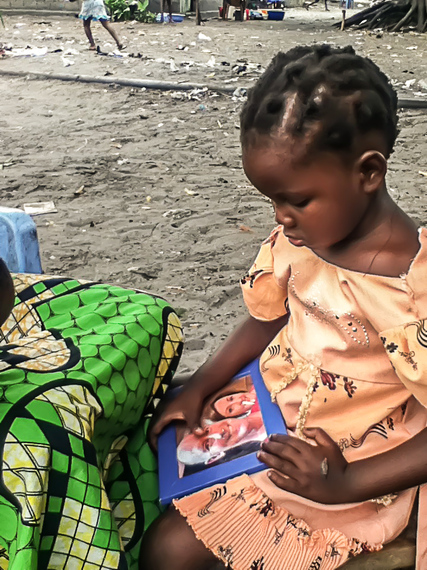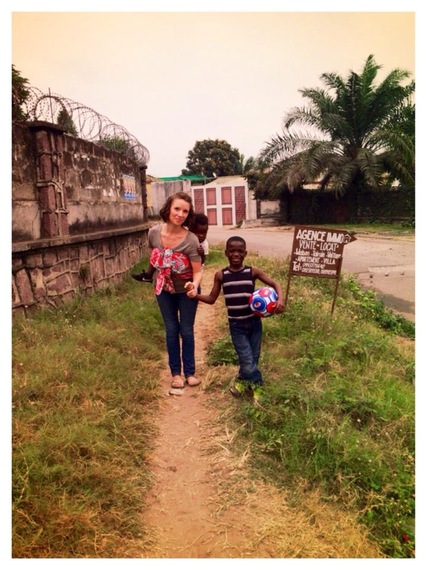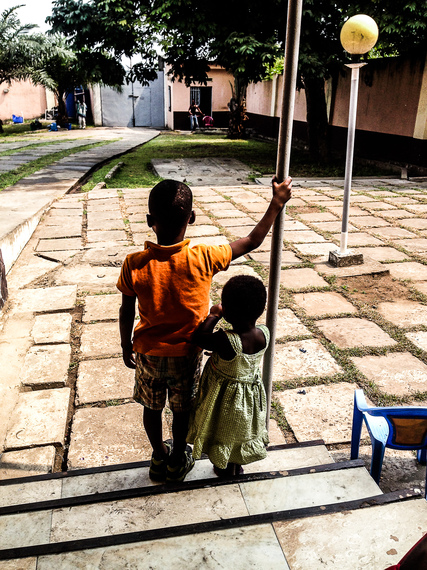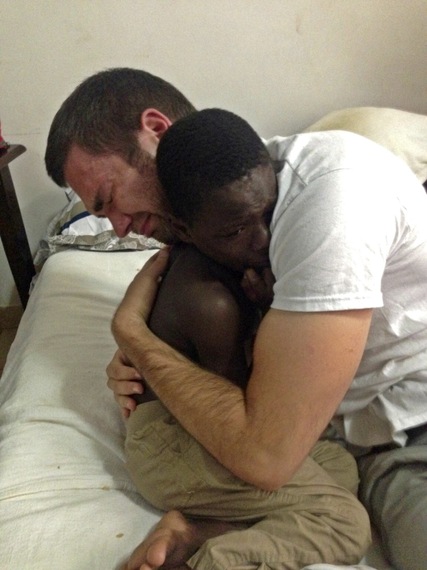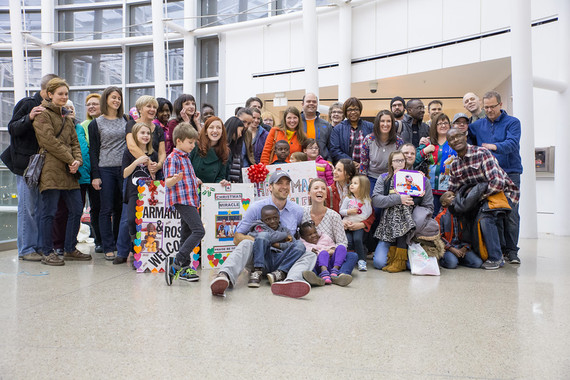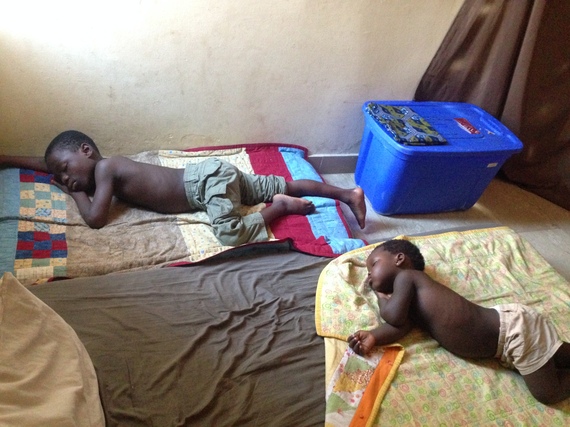In the middle of the crisis, Krysta Strasbaugh sees the banana trees. Their flat, broad leaves flutter like flags of truce above the barbed wire over the protective wall. She watches them every evening from the front porch where she nestles head to toe with her son on a twin-sized mattress, her toddler daughter on the smaller bed next to her. She listens to Armand and Rose breathe in and out, in and out, as she watches the rise and fall of their bare bellies.
"You are my lullabies," she whispers. "A silent night indeed."
A cockroach twitches in their bed. Out there, beyond the cement rooms and the tall, steel gray gate of the orphanage, lies the sprawling capital of Democratic Republic of the Congo. Kinshasa. A rhythmic mass of 11 million people in burgeoning slums and high rises. Out there, the Kinois are quick to give a greeting and tell her what they need before selling her what they've got. And they've all got something.
"Bana no yo?" (Are they your children?) they ask. "You've taken those children!" they yell. They don't understand her, in the commotion out there.
Krysta marvels at them from the top step of the porch, Kinshasa's lights flickering different shapes and sizes. More lights than she's seen in months, in the sliver of twinkling city that hovers above the concrete barrier. It occurs to her she'd spent all that time at eye level with her small children.
She snuggles closer to Armand and Rose, cocooned in the mosquito net that hangs from the porch's ceiling and wraps under their mattresses on the floor. She swats the roach with her iPhone and then she prays.
This is limbo.
Krysta's husband, James, is 8,500 miles away in Seattle. To get there, to bring her family together, she waits for one signature. But Congo refuses to let its children go.
"It's at a critical point," Krysta says. "Children need to be with their families."
The Strasbaughs were devastated when Congo finalized the adoption of Armand and Rose, and then informed them that the children couldn't leave. Neither could more than 1,000 other impoverished Congolese orphans, whose adoptive families were waiting for them around the world. The immigration minister wouldn't sign their exit papers. The central African nation brought a sudden stop to adopted children leaving the country, over concerns their new families may abuse or abandon them. The Congolese government later blamed allegedly falsified documents for the delay and told the U.S. State Department that corruption within Congo's adoption system needed reform.
"Okay. Fair enough. But then do something," Ambassador Susan Jacobs, U.S. State Department Special Advisor for Children's Issues, said in a recent telephone interview. "But don't punish children who aren't to blame and not let adoptions finalized by Congolese court go through."
In September of 2013, Congo's government informed the State Department the suspension would last up to one year while it considered a new adoption law. The issue devolved into diplomatic deadlock that dragged on for more than 2 years. Today, more than a thousand orphans remain stuck in the adoption pipeline.
"We have offered assistance," Jacobs says. "It makes no sense to us."
On January 19, Congo budged. The government rolled out new adoption legislation, saying every international adoption case had been reviewed. Every case. Adoptive parents, exhausted from dashed hope and outrage, whose cases were already approved by Congolese courts, want to believe their children are finally coming home.
"Parents are trying to temper their emotions, but you really can't contain this type of thing," Krysta says, as other adoptive families light up her phone. "Everything in us wants this to be it!"
The new adoption law goes to a vote in March. Adoptive families were informed that exit visas could be approved as early as the next few weeks. But until the government clarifies how many orphans will be allowed to leave the country, adoptive families remain at the mercy of a government that has not kept its word.
Ben, Leseli, Elijah, Glodi, Titus, Josephine and Pal are children who will never meet their adoptive parents, according to Mama Bears on a Mission. The group of adoptive mothers worldwide believes they are among at least 26 Congolese orphans who died waiting for exit visas. Krysta has a picture of the most recent heartbreak, a toddler in a pink bowed blouse and hair in six curly braids, who the organization says died in December.
Joseph is the name Emma Clement-Wriede is fighting to keep off that list. Emma is a Mama Bear in the Middle East who, with her husband, adopted two children from Congo. Since the suspension was put in place, her son Joseph has been diagnosed with cerebral palsy and epilepsy. Doctors say even a mild case of Malaria, a rampant disease in Africa, could be fatal to the 3-year-old. The couple has specialists waiting for Joseph, and knows things would be different had he been with his family, receiving proper care over the past year.
"At times it's been more difficult than I can say," Emma says. I'm talking with her on Facebook. It's 1 p.m. on Thursday in Kuwait, another day Emma waits for Congo to approve the medical exit permits she requested 2 months ago for both Joseph and 4-year-old Evie-Grace. She's never met her children, but is determined to communicate with them as often as she can. "Those children are mine, and I am theirs. There is no ocean, mountain, or politician that will break a mother's love for her child."
International law is in place to protect the best interests of children who, like Joseph and Evie-Grace, are being adopted across borders. Congo isn't party to the agreement.
"It's about all of the children." Ambassador Susan Jacobs says families in America are still waiting for 400 Congolese orphans. "We aren't giving up."
When Krysta and James were told to go back to Seattle without her kids, Krysta moved onto the front porch of Armand and Rose's foster home because the garage was being used as a kitchen.
"I just wanted to be with our kids," Krysta explains. "This was one thing we could control."
The foyer, 10-feet-wide by 20-feet-long, became her family's refuge. She stuffed towels into cracks to keep the cockroaches out, learned how to tuck the net snug and tight to keep Malaria-carrying mosquitoes at bay, draped a decorative scarf on the wall, and called it home. She was a sign-language interpreter in Seattle, but in Kinshasa she became a teacher to 40 children waiting for exit papers. Trading language lessons with the guards, she learned to speak Lingala fluently. She understood when orphans played with her skirt and asked, "Where's my mom?" and "When will my parents come from another place?" Mama Krysta, as they called her, didn't have answers. No one did.
Krysta teamed with Mama Bears on a Mission, other adoptive parents in Kinshasa and online, and with the advocacy group, Both Ends Burning, in an effort to shore up trust and move the process forward. In television interviews, petitions, blogs, tweets, and Facebook posts, the narrative remained firm and fused with love: let's work together to release the innocents.
"Many of us believed Congolese leadership wanted what's best for the children, that they were sincere in their efforts to protect them and put safeguards in place," Krysta says. "But as more time went by, it added to a layer of confusion. What is this about?"
The skepticism was mutual. The Kinois took pictures and questioned her at the bus stop when they saw Rose tied to Krysta's back in a liputa, the same way Congolese mothers carry their own children in rectangular pieces of patterned fabric. Establishing who she was, and why she was in Kinshasa, became a frequent and necessary conversation.
"Kitoko!" Beautiful, some said, and offered her a seat on a crowded bus. Sometimes the conversations led to friendship and prayers for her family, free transportation around town, a papaya on her doorstep, ice cream and nail polish on her birthday, and forgiveness for the steepness of her learning curve; speaking sentences in Lingala initially stumped her.
Other times, heads turned away, shaking disapproval. Strangers, men lining paved roads in the center of town, spewed insults and animosity at her family. Her car couldn't dodge the words fast enough to keep Rose and Armand from hearing them through the cracked window. Krysta wanted to shield her children from the firestorm and to understand the misconceptions.
"It seemed hard for them to accept that a mother from the other side of the world could love an adopted child, especially the way they love a biological child," she says. "Why would a mother do that?"
She and James suffered when their adoption of a 12-year-old girl in China failed. They lost contact with the child, and never fully recovered. The Strasbaughs tried again. They asked Rainbow Kids, an international adoption network, to help them.
"We saw the picture of Armand, and that's all we needed," Krysta says.
Hours after the Strasbaughs sent in their adoption papers, Krysta learned that she was pregnant. She miscarried several weeks later, but emotionally settled on the idea of a family of four. She and James wanted Armand and his sibling to share race and heritage. Krysta was in Seattle, shopping for baby shoes, when she got the call about Rose. She remembers sitting on a bench and cupping the phone in her hand. On it was a picture of their 1-year-old daughter. Their new family seemed within reach.
But in Kinshasa, convincing Congolese leadership of her intentions, was a challenge.
"Love is what makes a family," Krysta says. "We want Congo to know that we love our children, and we love their home country immensely."
She brought Armand and Rose with her to the offices of politicians, whose names she won't divulge in exchange for their empathy and respect. Inevitably the conversation would pause when she needed to find a coloring book, provide a snack, or make a potty run. This time, diplomatic deadlock would do the waiting.
"You could see countenances change. It was real. I am a mom. My kids need me the same way their children need them," Krysta says of the politicians. "We saw each other, not just the layers of cross-cultural communication, systems, and red tape."
Krysta found allies in Congo's government. Politicians who supported adoptive families reassured her that messages of love and collaboration were helping to make the case for action.
Weeks went by. Months. A year.
"Sometimes it feels like we're living a different iteration of the same day a million times," she wrote. Time was indifferent. Like the Congolese government, it stood by and watched while her children grew up on the front porch, and later in an apartment down the street. Rose's tiny halo of dark mahogany curls began to spiral sunward. And when she hugged Armand close one day, she realized he'd already grown another inch past her belly button. Her husband tried to mark the milestones with her through the computer screen. The kids blew kisses to James, "Papa," and their little dog, Sammy.
James works in Seattle as a project manager at World Vision. Their budget was already stretched, so the Strasbaughs spent just 10 days together in a year. Sending Papa back to Seattle alone, that goodbye, was painful for everyone. The looming wait, the unpredictability, became brutal over time. Other families had had enough. Some became so exasperated, they smuggled their children out of Congo, risking arrest and ultimately losing their kids.
Congo had continued to quash adoptive families' hopes. The government canceled the opportunity to meet with adoptive families in Washington D.C., a welfare check on Congolese children living in the U.S. Adoption administrators granted some exit visas early on, but to only 62 orphans. They ignored the one-year suspension deadline and blocked any exceptions.
Desperate and divided over their support for hard line or citizen diplomacy, adoptive families became hopeful, again. Last spring, Congo opened the adoption files and began to consider the cases.
"Surrender All" was a hymn Krysta recognized. Music from a nearby church frequently floated over the foster home's wall. Krysta hummed along from the front porch, her emotional incubator, where joy and grief tugged at her. That's where she began to embrace the poetry of the place. Congo became her family's calm, their rocking chair. Back and forth, back and forth. Mama Feza was a regular visitor to the foster home. Her colorful skirt swayed with reassurance, rustling under her bright red shawl and the cassava leaves she carried on her head. On a good day, Mama Feza would slit and fry silver fish, and the kids would strip them of their tiniest bones. Back and forth, back and forth. The nannies swept with "kombos," brooms of bristles collected from the spines of fallen palm fronds and bundled by hollowed tomato paste cans. Scrub, wring, rinse, wring, hang, repeat. Krysta found rhythmic comfort in routine piles of laundry. On days when the home had water, she'd carry bucketfuls up the slanted yard to the steps and look for solace in the soapy bubbles. She'd bathe her children at night, in a corner of the yard where they used flashlights to play with their shadows on the wall.
"There is no place I'd rather be." Krysta wrote in a letter for her children to treasure. "Don't you ever believe them if you hear this was a sacrifice. I want you to remember Congo, not only in your minds but also in your hearts and bodies. Congo is a beautiful part of you, sweet child, and you are a magnificent part of it. Someday our family will live together in the U.S. And as amazing as together will be, please know you don't ever have to close the door on your beginning."
Krysta felt nauseous in the waiting room at the immigration office. She wasn't sure if was sickness or anxiety. Or both. The Congolese government had begun the review of adoption cases, as promised, but only 100 cases were considered and about 72 approved. It was such a small percentage. Krysta knew how many orphans were waiting, and her emotions were once again split between hurting and healing. Armand and Rose were among those going home.
"I just couldn't believe it all came down to one piece of paper!"
The office staff waved her out with a happy "Bon Voyage," and Krysta's driver congratulated her. She snapped a photo of the paper and sent it to her husband. He was just a few minutes away, past the plaza, over the small bridge, and left of the bread stand, at their apartment, waiting with the kids. She couldn't get there fast enough. She needed to arrange travel details and say goodbye to the many people who had helped her family. Overwhelmed with gratitude and disbelief, Krysta stopped packing to check the folder several times, making sure it was really there, the document that would deliver her family from limbo.
After they checked in at N'djil International Airport, James put his hand on Krysta's shoulder and held her close. They cleared security. All they had to do was walk their children to the gate and board the plane home.
"This is it?" James's voice cracked. No more separation. No more goodbyes.
When I first see Krysta, she's praying. There are small, sweaty hands holding balloon strings, and there are teardrops on cheeks. A mother's eyes closed, her husband's arm around her. Their children's eyes open, peering at the world around them. It's more space than they are accustomed to in this new place called home.
"Merci, Nzambe."
Krysta thanks God in the International Terminal at Sea-Tac Airport, suffused in the love of friends and family she's seeing for the first time in 21 months. Rose and Armand are 3 and 7 years old. They were released just in time to make the 22-hour journey to this Silent Night. Everyone is singing now. It's Christmas Eve and Grandma's house is waiting for them. "Nkoko," as the kids call her, kept all of her Christmas decorations up for an entire year, anticipating this homecoming.
Krysta buckles her children into the backseat of their car before they leave the airport's parking garage. James, her strength, is by her side. Tomorrow is Christmas. There is a walk in the dog park with Sammy, a stop for frozen yogurt, and a visit to the Space Needle in the days ahead. They are home, and together, at last.
But out there, beyond continents and oceans, diplomatic deadlock, permits and promises, are spears of long grass still streaming against Congo's midnight blue sky. Out there, a thousand children are languishing in limbo under the banana trees, breathing in and out, Congo's precious lullabies.
Photo credits: Strasbaugh Family and Asa Mathat
Follow Sabra Gertsch on Twitter: www.twitter.com/SabraGertsch
Follow Sabra Gertsch on Facebook: www.facebook.com/sabra.anchor
Follow Sabra Gertsch on Instagram: www.instagram.com/seattlesabra/

